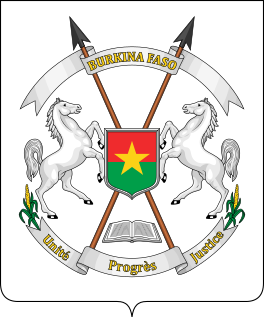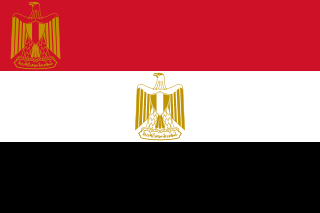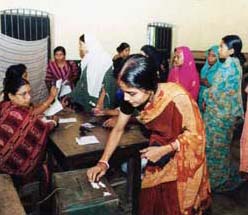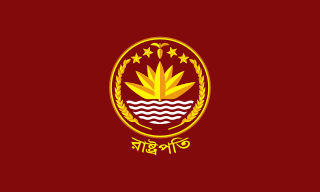
The Politics of Burkina Faso takes place in a framework of a semi-presidential republic, whereby the Prime Minister of Burkina Faso is the head of government, and of a multi-party system. The President of Burkina Faso is the head of state. Executive power is exercised by both the President and the Government. Legislative power is vested in both the government and parliament. The party system was dominated by the Congress for Democracy and Progress (CDP) until the 2014 Burkinabé uprising. Since then, the CDP has lost influence. The Judiciary is independent of the executive and the legislature. The Economist Intelligence Unit rated Burkina Faso as a "hybrid regime" in 2016.

The National Assembly were several national parliamentary government organizations of the Republic of China.

The President of Colombia, officially known as the President of the Republic of Colombia is the head of state and head of government of Colombia. The office of president was established upon the ratification of the Constitution of 1819, by the Congress of Angostura, convened in December 1819, when Colombia was the "Gran Colombia". The first president, General Simón Bolívar, took office in 1819. His position, initially self-proclaimed, was subsequently ratified by Congress.

The President of the Arab Republic of Egypt is the head of state of Egypt. Under the various iterations of the Constitution of Egypt, the president is also the Supreme Commander of the Armed Forces and head of the executive branch of the Egyptian government. The current president is Abdel Fattah el-Sisi, in office since 8 June 2014.

The Prime Minister of the People's Republic of Bangladesh is the Head of the Government of Bangladesh. The Prime Minister and the Cabinet are collectively accountable for their policies and actions to the Parliament, to their political party and ultimately to the electorate.

Elections in Bangladesh gives information on election and election results in Bangladesh.
Shahabuddin Ahmed served as the President of Bangladesh from 1996 to 2001, and the Chief Justice of Bangladesh from 1990 to 1995. He previously served as the acting President during 1990-91 when Hussain Muhammad Ershad resigned from the post. He headed a caretaker government and held a general election in February 1991.
In early 2006, Prime Minister Kostas Karamanlis announced ruling New Democracy's initiative for a new amendment of the Greek Constitution of 1975/1986/2001, and clarified his propositions speaking to the deputies of his party on 11 May 2006.

The Chief Adviser was the head of the Caretaker Government of the People's Republic of Bangladesh who served as the Head of Government for 90 days during transition between one elected government to another during the term of the caretaker government. The Caretaker Government was mandated only to hold the Parliamentary Elections in Bangladesh. The Chief Adviser headed an Advisory Committee comprising ten Advisers. With powers roughly equivalent to those of the Prime Minister of an elected government, his executive power was constrained with certain constitutional limitations. He, as well as the other advisers, were selected from politically neutral individuals so as to be acceptable to all major political parties.

The Fifth National Parliamentary Elections 1991 were held in Bangladesh on 27 February 1991. The result was a victory for the Bangladesh Nationalist Party, which won 140 of the 300 seats. Voter turnout was 55.4%. As a result, BNP leader Khaleda Zia was sworn in as Prime Minister on 20 March.
The Caretaker Government of Bangladesh was a form of government in which Bangladesh used to be ruled by a selected government for an interim period during the transition from one elected government to another, after the completion of tenure of the former, during the period between 1996 and 2008. The outgoing elected government used to hand over its power to the nonelected nonpartisan caretaker government (CTG).
1991 (MCMXCI) was a common year starting on Tuesday of the Gregorian calendar, the 1991st year of the Common Era (CE) and Anno Domini (AD) designations, the 991st year of the 2nd millennium, the 91st year of the 20th century, and the 2nd year of the 1990s decade.
The Government of Bangladesh has three branches; the Executive branch, the Legislative branch and the Judicial branch.
The Election Commission of Bangladesh, abbreviated EC, is an independent constitutional body of the nation of Bangladesh that operates the legal functions of Election law in Bangladesh.

Since Kenya gained independence in 1963 the constitution has been altered many times. During the early years of Kenya's existence the constitution was abused by the president and the ruling party to gain and consolidate power through the creation of a single-party state, the abolition of secret ballots and through increasing the power and prestige that comes with being the president. However, more recently the constitution has been used to make Kenya more democratic through the addition of a Prime Minister, and two Deputy Prime Ministers and the abolition of section 2A of the constitution, which had prevented Kenya from being a multi-party state was now repealed.
A committee formed in February 2011 by the Egyptian military following suspension of the constitution during the 2011 Egyptian revolution. The committee's purpose is to review the constitution of Egypt, to be ratified by a referendum.
Secularism is one of the four fundamental principles according to the original 1972 Constitution of Bangladesh. The secularism principle was removed from the constitution in 1977 by Ziaur Rahman, replaced with a statement of "absolute trust and faith in Almighty Allah", and Islam was declared the state religion in 1988. In 2010, the Bangladesh Supreme Court restored secularism as one of the basic tenets of the constitution but Islam remained the state religion. Over 90% of Bangladeshis are Muslims, the rest being Hindus 8%, Buddhists 1%, Christians 0.9%, and others 0.1%. People in Bangladesh observe various secular festivals at different times throughout the year. The ethos of secularism in South Asia is in many ways different from that of Western versions that assert complete separation of church and state. Rather, it is the freedom of individuals to practice the faith he or she desires without being subject to any form of state or communal discrimination.
The Constitution of the People's Republic of Bangladesh was adopted and enacted on 4 November 1972, after the victory of the independent country on 16 December 1971. As of 2018 the Constitution has been amended 17 times. Amending the Constitution of Bangladesh is the process of making changes to the nation's fundamental law or supreme law.

















